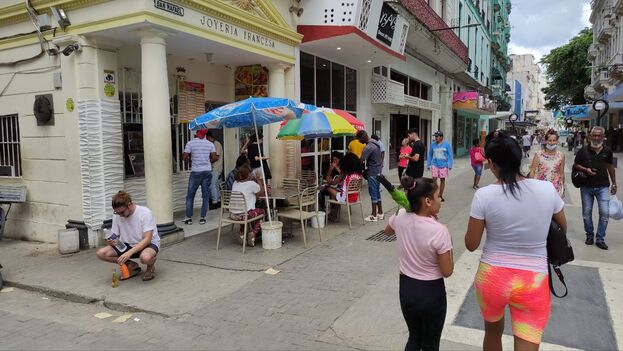
![]() 14ymedio, Havana, 13 December 2022 — As if the current legislation, including the list of 124 prohibited activities, were not limiting enough for the creation of private companies in Cuba, the Government seems to be determined to stop this process, even going against its own laws. This is, among other things, what Oniel Díaz Castellanos, founder of the consultancy Auge, denounces.
14ymedio, Havana, 13 December 2022 — As if the current legislation, including the list of 124 prohibited activities, were not limiting enough for the creation of private companies in Cuba, the Government seems to be determined to stop this process, even going against its own laws. This is, among other things, what Oniel Díaz Castellanos, founder of the consultancy Auge, denounces.
On Monday, the National Assembly of People’s Power approved the law on the State budget for 2023 and, as part of it, eliminated the tax exemption for micro, small or medium-sized enterprises (SMEs) during their first year of life. As reported in the official press, “from the need for all economic actors to contribute to generate income for the financing of social services and programs, the tax exemption for SMEs is without effect, for a period of six months when they arise from a reconversion and one year when they are newly created, beginning in 2023. The previously constituted SMEs that are enjoying this benefit will keep it until the end of the period for which it was granted to them.”
The measure, says Díaz Castellanos in a direct Facebook broadcast, is not only lethal for new entrepreneurs and for attracting investments, but also goes against the laws approved by the regime itself.
“There is a decree-law for SMEs, a list of prohibited activities, but there is no exchange market, there are no inputs, there are not enough credits, there is a rigid regulatory framework and, on top of that, now there is zero incentive, zero support, because the company since it begins to exist already has to pay taxes as if it had been operating its whole life,” the consultant argues.
Faced with this, he notes that, in the Mariel Special Development Zone, foreign or domestic investors “have ten years free of utility taxes, are exempt from the labour force tax and have several incentives.” The measures announced, he says, “tremendously contradict that phrase of equal conditions among economic actors.”
The government trend against SMEs, however, is not something new. Díaz Castellanos himself has been warning for weeks of the setback that the process of creating private companies seems to be suffering. One example is that the State, which had been approving between 100 and 120 small businesses weekly, has spent “two consecutive weeks without any new SMEs being announced, unprecedented in the last twelve months.”
“You can’t whistle and stick out your tongue at the same time. Either the private sector is accepted or it is not. And the second option no longer fits with the guidelines and congresses of the last ten years,” the founder of Auge wrote this Sunday on his social networks. Faced with an avalanche of questions and comments, Díaz Castellanos promised details directly and finally transmitted them on Monday night.
The entrepreneur said that there are more than 10,000 applications to be SMEs and that, of them, more than 4,000 remain unapproved, “not a small number.” They are encountering several obstacles; among them, forcing them to withdraw the commercialization of their main activities and put them as secondary activities, or questioning those companies that have a broad corporate purpose (something common in societies where the free market governs, which allows companies not to stick to a single purpose but to many possible ones, so that they have flexibility in their activities and the risk of investment is reduced). All this, Díaz Castellanos reiterates, does not appear either in the decree-law of SMEs or in the list of prohibited activities, which is the current regulatory framework.
None of this, he adds, “affects the country’s system, violates the Constitution of the Republic, or causes economic, social or political damage to our country.”
As for the changes in start-up conditions, “the only thing they do is compromise the credibility of the country’s economic policy and the credibility of the institutions that apply it,” says the businessman, for whom “without stability, without confidence in the regulations, in the way they are applied, in the institutions, the country will not move forward.” A “powerful business fabric,” says the entrepreneur is, among other things, what Cuba needs to get out of the great crisis in which it finds itself.
Díaz Castellanos defends himself from the criticism received on the part of officialdom, which argues that these are “union demands.” He explains that these “hesitations” harm “everyone.” “For those who think that they are facing Monsanto, Tesla or Amazon, the great monopolies of global capitalism, I must tell them that no, they are simply criticizing small companies that have few workers, few resources — small companies that at the moment are extremely limited by the current context,” said the consultant, who pointed out that enterprises “are already controlled,” such as restricting one SME per capita with a limit of 100 workers.
Similarly, he declares, “there is no turning back in the role of the private sector,” which, he says, based on data from the National Assembly itself, represents 34% of the labour force and between 12 and 14% of GDP. In his conclusion, he cautiously believes that what was built in Cuba in the last sixty years “was a mistake, turning its back on the market.”
Translated by Regina Anavy
____________
COLLABORATE WITH OUR WORK: The 14ymedio team is committed to practicing serious journalism that reflects Cuba’s reality in all its depth. Thank you for joining us on this long journey. We invite you to continue supporting us by becoming a member of 14ymedio now. Together we can continue transforming journalism in Cuba.
